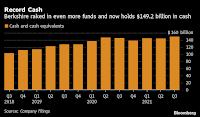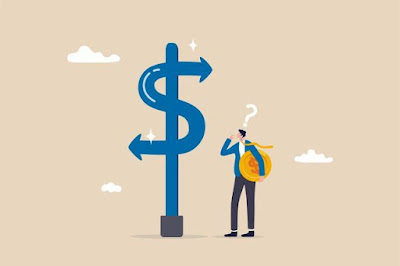One
of my idolized investors of all time, Warren Buffett, has a pretty exciting
portfolio position for his holding company Berkshire Hathaway. I'm always
following his latest investment move, and to my surprise, I found out that one
of his largest positions is cash on hand. According to the company's earnings
announcement on Saturday, Berkshire Hathaway's cash hoard topped $149.2 billion in
the third quarter, exceeding a previous high established in early 2020.
The new
high came despite Buffett pouring more money into stock repurchases, with $7.6
billion in repurchases in the quarter, the third-highest total since the board
modified its buyback strategy in 2018. This is an exciting topic to point out.
There must be a reason why Warren Buffett is piling up cash in his portfolio
instead of buying new stocks. In this
article, I will talk about my opinion on why Warren Buffett is just piling cash
in the Berkshire Hathaway portfolio. Moreover, I will talk about how this
answers my father's large cash balances in his portfolio.
Nothing Much to Buy!
Buffett has wrestled with the high-class problem of having too much money in Berkshire Hathaway's pockets and not enough opportunities to invest it in higher-returning assets. With no large deals in recent quarters, Berkshire Hathaway's CEO has resorted to stock buybacks to deploy the capital. Even the increased buybacks in the third quarter could not keep Berkshire's cash reserves from expanding.
I believe Warren Buffett is just piling up cash in Berkshire Hathaway's portfolio because he did not see any good opportunities. Piling up cash in his portfolio is a very strategic move. He is saving ammunition for when Mr. Market is emotional and gives out bargains to investors.
Buffett has wrestled with the high-class problem of having too much money in Berkshire Hathaway's pockets and not enough opportunities to invest it in higher-returning assets. With no large deals in recent quarters, Berkshire Hathaway's CEO has resorted to stock buybacks to deploy the capital. Even the increased buybacks in the third quarter could not keep Berkshire's cash reserves from expanding.
I believe Warren Buffett is just piling up cash in Berkshire Hathaway's portfolio because he did not see any good opportunities. Piling up cash in his portfolio is a very strategic move. He is saving ammunition for when Mr. Market is emotional and gives out bargains to investors.
A Value Investor at Heart
Benjamin Graham, the pioneer of value investing, was Buffett's mentor. Buffett has moved away from a strict concentration on stock prices over time. However, it is probably safe to argue that he is still at heart a value investor.
Take a look at the graph below with that in mind. It depicts the S&P 500 index's cyclically adjusted price-to-earnings (CAPE) for the previous 60 years. The CAPE statistic, popularized by Yale professor and author Robert Shiller, is calculated by dividing the price of the S&P 500 by average profits over the past ten years, adjusted for inflation.
The S&P 500's valuation is currently at its second-highest level since Buffett took over Berkshire Hathaway. The only time the index's CAPE was higher was in the years preceding up to and immediately following 2000.
Of course, we all know what happened after the market reached such a high valuation level. The stock market plummeted. The S&P 500 took seven years to recover fully. (Then, with the financial crisis of 2008 and 2009, it plummeted again.)
I am not sure if Buffett is looking at a chart similar to the one above. You can bet your bottom dollar that he keeps a careful eye on the general market valuation. Furthermore, he is aware that buying equities when they're extremely pricey rarely pays off.
Cash is King!
Yes, holding cash, in the long run, will indeed be eaten out by inflation. However, holding cash can be a strategic investment move. You do not have to rush investing your money just because you have the money. Sometimes, doing nothing and just waiting can result in a better investment result. When you have cash on hand, this can be beneficial when an investment opportunity does come out.
I am pretty sure Warren Buffett has a lot of investment opportunities if the market goes to a bear market. With the cash amount in Berkshire Hathaway's portfolio, he can purchase so many companies listed in the stock market. He is brilliant; he does not simply invest unless he gets a hot bargain. If you look at his investment move in 2008, he was purchasing and adding positions into his portfolio when investors ran away from the market. Even though their stock values were dropping, Warren Buffet calmly provided a lifeline to a few companies.
Buffett's Berkshire Hathaway conducted partnerships with big blue-chip corporations like Mars, Goldman Sachs, Bank of America, and Dow Chemical from 2008 to 2011. Berkshire Hathaway used its "gigantic cash hoard to move quickly and exact advantageous terms that triggered a stream of payments from the debtors, taking advantage of the prevailing panic environment.
Buffett, for example, invested $5 billion in Goldman Sachs shortly after Lehman Brothers went bankrupt, giving the firm a huge boost in confidence that helped its stock price recover. Buffett paid $5 billion in preferred stock and received warrants for another $5 billion in ordinary stock. Buffett received a $500 million bonus when Goldman purchased back the preferred stock for $5.64 billion in 2011. Then, last week, Buffett exercised his option on 13.1 million common shares, worth $2.07 billion.
Another example: in the spring of 2008, Buffett assisted with the financing of Mars' $23 billion acquisition of Wrigley, when big-ticket acquisitions were swiftly going out of favor. According to the Journal, Mars recently purchased $4.4 billion in bonds from Berkshire Hathaway, resulting in a profit of $680 million for Berkshire.
As you can see, Warren Buffett couldn't take these investment opportunities if he did not have much cash in his portfolio. I am sure that Warren has a better plan with the large cash balance in his portfolio.
How Warren's Current Investment Move reminds me of my Father.
Warren somewhat reminds me of my father because he is doing the same thing. My father seems to be not interested in investing any cash in anything. Every time I ask him what he is planning to do with his cash position, he always replies to me he does not know what to invest in. Seeing this somehow answers my question as to why my father is not investing in anything at the current moment. Simply piling up cash in your portfolio gives you the advantage to purchase things if there is a bargain.
I remembered how my father bought the current factory for the company back in 2009. He did not invest in anything for a very long time and had his money simply parked in the CDs account. When he sees the opportunity to purchase the factory in 2009, he has the cash to purchase it without taking a loan. If my father did not have the cash to invest at that time, he would have missed a fantastic investment opportunity.
I am pretty sure my father is also just piling up cash so that he can invest when there is an opportunity out there. If he sees nothing interesting to him at the moment, he will wait till something does come out. Besides, I think my father is doing way better compounding his cash balance in Indonesia CDs that generate about 4-6% annually. My father is getting a much better yield rate from the bank due to the size of his investment.
I have already been working in my father's company for quite some time. I am constantly seeing what he is doing with his investment portfolio. He is not expanding the manufacturing business and is simply being very conservative and defensive with his asset allocation.
Starting or expanding a business does not guarantee success, in my opinion. I have seen many of my wealthy friends that I know who use the money given by their parents to start a business. Many of them didn't succeed and incurred a loss to their capital. I am glad that my father did not give me more capital and wants me to figure out how I can increase my income stream on my own. I used to think he was very stingy with his money, but I learned something valuable from him. I learned how to be efficient with my finance because of my father. I am also more strategic when starting a business venture since I have very limited capital. If my father wasn't conservative with his giving, I would probably end up like my wealthy friends who lost money from starting a business.
Anyways, I'm going to continue to follow his investment journey to learn what he is going to do with the large cash reserves in his portfolio. Nevertheless, I see no investment opportunities that catch my father's attention at the time being. I will let him decide what he wants to do with his investment portfolio, and I will focus on mine as well.
What do I learn From This?
I learn from writing this article that I have a different opinion of having cash reserve in your portfolio. If I had more cash saved up, I would have been able to purchase more of Alibaba Group (Ticker: BABA) right now. However, I don't have any more cash to make this investment move. I learned that you don't have to rush investing your money right away from this. Sometimes, you just need to be patient, and a good investment opportunity will come by itself.
Having cash stand by in your portfolio enables you to make an investment move. Without cash, you can't buy anything. So don't rush yourself when you have some money saved up already. Be patient and always on the lookout.
Conclusion
I hope this article gives readers an understanding of why Warren Buffett is simply stacking more cash in his portfolio instead of investing. Warren's investment move by simply doing nothing reminds me of what my father is currently doing. He is waiting for a good opportunity to come by and be patient. In the current market, everything is expensive. Warren has not many good deals to invest in, so piling up cash position is a smart move.
Yes, cash will indeed be eaten up by inflation in a long period of time. However, piling up cash position in your investment portfolio can be a strategic move. With an available cash reserve, you can swoop on opportunities when you see one. So what's your investment move now? Are you piling up cash just like Buffett? Or do you see anything worth investing in now already? Please leave your comment below.








Malta Journal delivers news with remarkable clarity and depth, keeping readers informed about Malta’s politics, culture, economy, and more. Their commitment to accurate reporting and insightful analysis makes this platform truly indispensable for anyone seeking quality information.
ReplyDeleteTurkey Report delivers news with precision and clarity, providing readers with an informed perspective on Turkish affairs. Its balanced reporting and analytical approach make it a valuable resource for anyone looking to understand the country’s dynamics.
ReplyDeleteI truly admire Finland Journal for its comprehensive coverage of tech, business, and climate. The articles are well-researched, easy to follow, and consistently provide meaningful insights that help readers understand complex global developments.
ReplyDelete